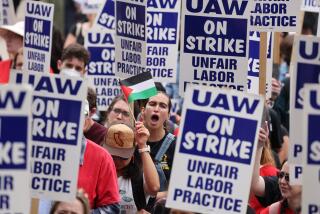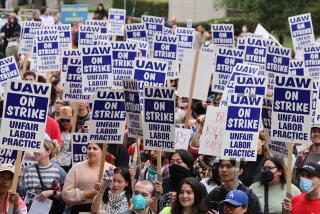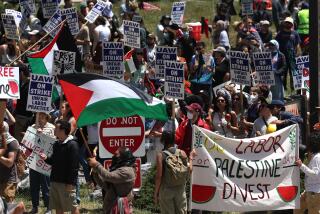Bernstein Column on UFW Case Omitted Several Points
- Share via
It’s a shame that a respected newspaper would be plagued by a writer whose biases are such that they overwhelm even a fundamental journalistic ethic of accurate reportage.
The information for Harry Bernstein’s Feb. 25 column, “Ruling May Devastate Chavez’s Union,” obviously was obtained from an apparent single source: the United Farm Workers union.
Bernstein did not interview me or any of my attorneys who obtained the $1.7-million judgment in my case against the UFW.
Bernstein attacked the Superior Court judge, William Lehnhardt, who issued the decision, comparing the decision to rural justice in the early South.
Bernstein implies that the UFW was forced to accept a biased judge for the trial; however, the UFW was well aware of Lehnhardt’s prior involvement in the strike and had numerous opportunities to have him removed from the case before the trial.
The UFW voluntarily chose to waive its right to a jury and its unchallengeable right to have Lehnhardt removed before the trial.
Now that the decision has been handed down, the union and its apologist, Bernstein, can yell red-neck “rural justice” as if the UFW was coerced into a non-jury trial before Lehnhardt.
Bernstein’s column was misleading or inaccurate in the following ways:
- Bernstein refers to one violent incident. Fact: There were four major incidents of riotous violence, as well as intense daily attacks on my personnel over a three-month period.
- Bernstein described a tear gas incident where “one officer was slightly injured.” Fact: Twenty-one officers were injured, three seriously. Dozens of Sheriff’s Department vehicles suffered heavy damage from rocks, concrete chunks and metal fence posts thrown through the air.
- The column stated: “None of the growers . . . suffered any serious injuries.” Fact: Color videotapes, photographs and oral testimony of individuals injured by the union’s violent attacks were presented at trial.
- Bernstein describes death and injury to union strikers during the strike.
According to court records, the two injured workers referred to were part of a group of hundreds of strikers who attacked women and children harvesting the crops.
Security guards were protecting the replacement workers. After “full” documentation of the incident by the UFW to the district attorney, there was insufficient evidence to support the filing of criminal charges.
The farm worker killed was part of a group of 100 strikers carrying clubs and other weapons who rushed a group of Filipino workers.
A shot was fired by unknown persons, and Rufino Contreras was killed. Lehnhardt did what any other judge would have done in dismissing the charges because of a lack of evidence.
- Bernstein decribes the property damage award of “only $3,000,” implying that was the only “real damage.” In fact, I paid more than $20,000 for damage to my equipment during the strike. Lehnhardt refused to award the full amount because of the strict burden of proof he imposed on me.
A court has found by clear and convincing evidence (not a mere preponderance) that the UFW intentionally conducted an unlawful and violent strike.
Such a finding is a bitter pill for Cesar Chavez and his apologist Harry Bernstein.
CARL J. MAGGIO
Plaintiff, Maggio vs. UFW
More to Read
Sign up for Essential California
The most important California stories and recommendations in your inbox every morning.
You may occasionally receive promotional content from the Los Angeles Times.













